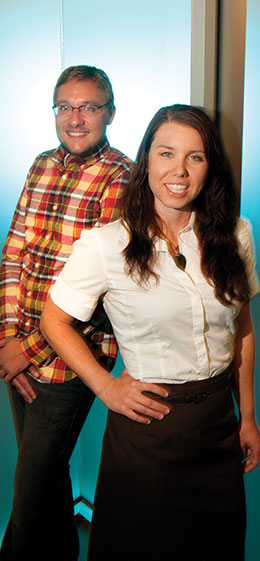Volume 31 · Number 1 · Fall 2013
The Campaign for UC Davis: Investing in young scientists
Doctoral students Chris Barnhart and Lisa Komoroske are recipients of ARCS Foundation awards. Barnhart works at the MIND Institute and is researching PCBs and their effect on brain development. Komoroske works at the Bodega Marine Laboratory and is researching climate change’s effects on California Delta fish.(Gregory Urquiaga/UC Davis)
ARCS Foundation recognizes UC Davis students as up-and-coming ‘world changers.’
Inside a lab at the School of Veterinary Medicine, Chris Barnhart researches how exposure of the developing brain to polychlorinated biphenyl (PCBs) during pregnancy or breastfeeding may impede brain development. Not far away at the Department of Wildlife, Fish, and Conservation Biology, Lisa Komoroske studies how climate change affects fish populations.
In exploring different aspects of how living things are influenced by their environment, the two doctoral students share a common benefactor: Both have been supported by the Northern California chapter of the Achievement Rewards for College Scientists Foundation.
The ARCS Foundation initially grew out of the space race between the U.S. and the former Soviet Union. After the Soviet launch of the Sputnik satellite, a group of women in Los Angeles started the nonprofit organization in 1958 to support the education of young U.S. scientists. The Northern California chapter was founded in 1970, and since then the women’s organization has awarded more than $2 million to UC Davis for dozens of students pursuing degrees in science, medicine and engineering-related fields. Not restricted to tuition expenses alone, each ARCS Award is designed to offer generous flexibility to each student, inviting them to a wider array of research choices than they might otherwise have been able to pursue.
Barnhart and Komoroske are among 12 ARCS Scholars at UC Davis this year.
Barnhart has been awarded a $10,000 annual fellowship for four consecutive years for his research on cellular and molecular mechanisms underlying the developmental neurotoxicity of PCBs. The man-made organic pollutants were widely used in industry as cooling and insulating fluids until they were banned in the 1970s over concerns about their toxicity and accumulation in the environment. Human PCB exposure occurs primarily through consumption of contaminated fish or dairy products, or by breathing PCBs in the air released from paints and caulking.
In collaboration with the School of Veterinary Medicine and UC Davis MIND Institute faculty, Barnhart led a complex, collaborative research project to study the effects of PCBs on learning and memory in mice exposed via their mothers’ diet before and after birth. This research strongly suggests that PCBs could add to autism risk in genetically predisposed children. The complex brain development disorder affects one in every 88 children.
Barnhart said recognition by the ARCS Foundation has led to opportunities to share his research findings with colleagues at regional scientific meetings. “The ARCS Awards have allowed me to devote my energy and time to intellectual endeavors and participate in conferences and dissertation research,” he said.
Komoroske, a doctoral student in the Graduate Group in Ecology, received her second ARCS fellowship for her research on how coastal and estuarine fish will physiologically cope with climate change. Collaborating with the Bodega Ocean Acidification Research group, Komoroske investigates how predicted pH changes affect protein expression in rockfish that are important for California coastal fisheries. She is currently studying the effects of salinity and temperature increase on the threatened delta smelt, which may be important for management of the California Delta.
“Being able to be flexible to try new approaches is so critical to innovation in science and technology, but oftentimes many funding sources are hesitant to fund these ideas because they have more ‘unknowns’ and a higher perceived risk of failure,” said Komoroske.
“Receiving the ARCS fellowship has allowed me to increase both the breadth and depth of my dissertation research because I could use cutting-edge methodologies.”
UC Davis is one of just seven universities in Northern California that receives ARCS funds, said ARCS spokesperson Ann-Marie Fowler, “Since the beginning, the organization pursued a regional approach with recognition offered for the finest departments in their fields — where world changers and innovators were going to go, study and succeed in life.”

